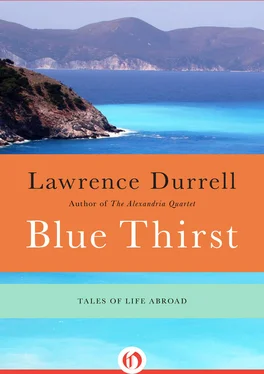There were other factors about ordinary living which I mustn’t forget to mention, just to draw the picture of this rather primitive way of life. In this hot country, indeed in most of the Mediterranean at this time there was no refrigeration; just a few ice factories where one bought blocks of ice and crammed them into wooden ice boxes. In Corfu there was no butter and the milk was goat’s milk; the beef was non existent, there was only lamb for people with small incomes but good lamb and sometimes pork. Chickens were thin and scrawny.
The best refrigerator I know is a deep well; and for most of my island life we lowered our bottles and tinned butter down the well in a basket with a long length of line. Or shoved it into a sea cave. Sometimes it was so hot that we carried our dinner table out into the bay and set it down in the water. It was cool enough if you sat with water up to your waist while you dined. The water was so still and clear that the candles hardly moved on such summer nights. And the bronze moon was huge.
Our heating system was mostly charcoal, which meant twenty minutes to boil a kettle for a cup of tea with much puffing and blowing. Primus stoves were very expensive and had a tendency to explode. As for light we used paraffin with its peculiar smell and though the Aladdin lamp had been invented it was expensive and was hard to obtain mantles.
The roads were washed out in winter and the little local bus service was caïques in summer; but when the sea was high they couldn’t go. Most of you now have been to Greece or have seen enough of Greece in pictures to know those little island boats which ferry the melons and the fruit and vegetables back and forward. Well, they’re also passenger buses, and in summer we had a daily waterbus to town which took two hours flat and the same back in the evening which took two and a half hours flat according to what the wind and weather was like. This fragile line of communication was completely washed out in the winter and we were left alone on this extraordinary hillside. I started at once to try and learn Greek, which is a very difficult language. I’d only done two years of classical Greek and it really wasn’t enough. I hadn’t been interested until I got there. But there were things which struck me very forcibly and touched me very much. Mainly that when I was starting on doing Demotic Greek with the local schoolmaster, I found that in almost any Greek sentence about 3 out of 5 words — no that’s an exaggeration — let’s say 3 out of 7 words came out of Aristotle or Homer. And it was a perfectly astonishing realization to me that Greece hadn’t aged — the language that Greece used — hadn’t aged as much as our own English because we started with the old Attic grammar and while a lot of the tenses had changed, and naturally a lot of vocabulary had changed and so on, the actual structure of the language as such is quite visibly there, still. And I don’t think you could begin to teach English out of Chaucer, which would be roughly the comparison to today. And then Homer became more actual to me in this context, and I started brushing up the little ancient Greek I knew, and a whole winter, my first whole winter passed in that way, studying, teeth chattering with cold. There was no chimney in the house and finally my landlord put logs in an ordinary room there and burnt them so that the room filled with smoke and the smoke went out steadily through the ceiling. It was more Homeric than Homer. We roasted lambs on the spit and mopped up the blood. And drank retzina, the resined wine of Greece.
But there were also other fascinating things. When I started to learn Greek it was the popular tongue I studied, the so-called Demotic. But I rapidly realized that there were two distinct Greek languages — one for the newspapers and one for the hearth. The popular one had evolved itself comfortably by peasant use, and a much simplified syntactical approach. But this was considered too vulgar to write down, and a highly purified sort of Greek had been evolved for the newspapers, thus causing a great and unnecessary problem for schools and parents. Can you imagine talking the way you do in ordinary life and yet being forced to read Elizabethan prose every time you opened the Los Angeles Times, with a classier and more classical vocabulary? This has been a real plague for the Greek poets and only now has the battle been won for Demotic Greek thanks to half a century of taming and civilizing this language for the uses of poetry. But at the turn of the century when someone suggested turning the Bible into Modern Demotic Greek there were street battles and deaths. Only a highly educated classics scholar could read the Bible then, and the priests didn’t want to let the peasants know the meaning of what they read or chanted. This battle was carried on — the battle of the two languages — and when I was there there were even two different words for ‘wine’ and ‘bread.’ Well by great luck an enlightened Minister of Education — whom you will know under the name of Kazanzakis, author of Zorba The Greek —gave permission for the Greek classics to be turned into modern Greek for the schools; and so the children of Greece came at last into the heritage of their native literature, and could read Homer and Sophocles in a good crib, as we would call it in England. Well, the two kids of my landlord were then going to the village school and were being taught Homer in a pretty storybook version. They came back at dusk usually, but one night I heard the whole family talking and laughing until the late hours. It was strange because they usually were in bed by the time darkness fell in order to save fuel. I felt that something special must have happened. The next morning the landlord came to me and said “Oh gosh, I’ve got the most wonderful story these kids are reading. I wish I could explain it to you, but your Greek isn’t good enough. It’s apparently by a man called Homeros. What a pity you don’t know Greek any better. It’s a marvelous story.” Then he began telling me the story of Ulysses, which he himself could not read — he had vaguely heard Homer’s name but he didn’t know the story. But kids were bringing their lesson books back in the evening and he was engulfing the story. It struck me so forcibly because I had the translation by T. E. Lawrence, and I had two other versions right there in the house and we were always having a look at them just to compare daily life in modern Greece with daily life in ancient Greece, and I was always struck by the degree to which we found everything up to date. I don’t believe a place like Ithaca, for example, has changed at all since Ulysses went back there. I certainly spent a few weeks there in exactly the sort of conditions that Ulysses must’ve found. But now, of course, the end is near at hand because last year they got television. (I wasn’t joking. I like television and it wasn’t a snide remark.) But when you have village manners and village customs with all the tremendous tradition and hospitality and a perfectly formal way of looking at things, town manners imposed on you by a box, which naturally entices you with the things it has to offer, naturally alter the old stately easygoing ways. It’s done it to us all. It’s done it to all our countries. And up to now it hasn’t been possible in all those mountains in Greece to get a decent television service working. But the Greeks being ingenious have managed it, and I’m afraid it’s going into action now, which means that all those very remote little villages which one used to know will now be glued to Athens. And of course Athens contains everything meretricious that London and New York can provide for it in terms of modern Greece. So inevitably it will have a radical effect on Greek manners of the old style. So this is why perhaps it’s a bit nostalgic, my reminiscences of that forgotten Greece. For example, the monuments were not ringed about. I have slept for a whole month in a sleeping bag on Sunion and watched every dawn come up icy with dew. I slept inside the lion gate at Mycenae and among the statues of Olympia. There was no tourism then and there was no money to be had from monuments. In fact, in Olympia when I asked for the museum curator he came down on a bicycle, climbed into a tree and took the key down and opened the front door of the museum for me, and when we’d had a good look ‘round he climbed into the tree and replaced the key. I could have pinched the lot. It was so easygoing and so Irish and absolutely unpretentious that one felt very much at home.
Читать дальше












